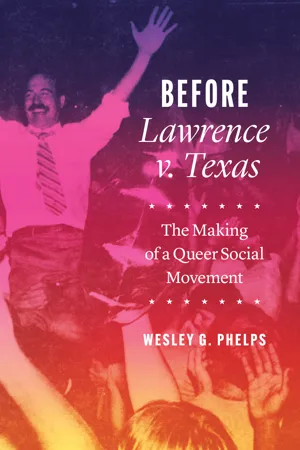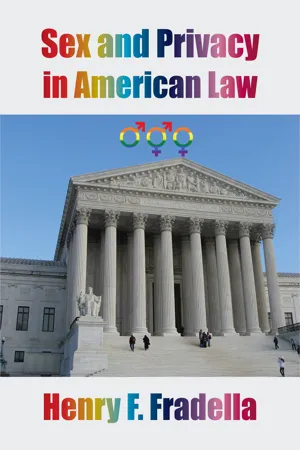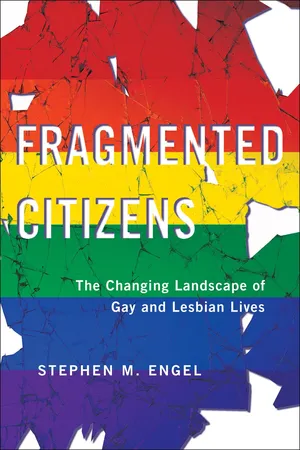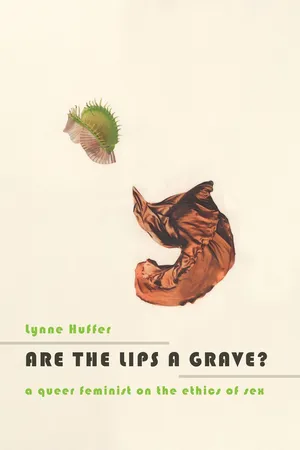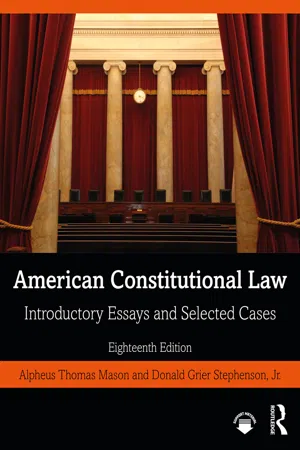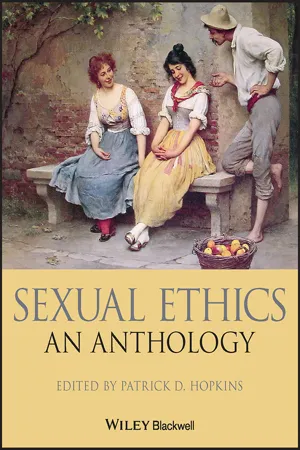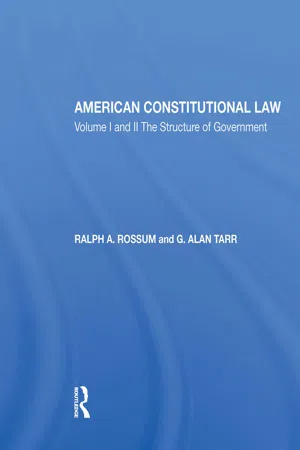Politics & International Relations
Lawrence v. Texas
"Lawrence v. Texas" was a landmark 2003 U.S. Supreme Court case that struck down the state law criminalizing homosexual sex. The ruling invalidated laws in 14 states that prohibited same-sex couples from engaging in intimate relations. The decision was a significant victory for LGBTQ rights and marked a pivotal moment in the legal recognition of same-sex relationships in the United States.
Written by Perlego with AI-assistance
Related key terms
8 Key excerpts on "Lawrence v. Texas"
- eBook - ePub
Before Lawrence v. Texas
The Making of a Queer Social Movement
- Wesley G. Phelps(Author)
- 2023(Publication Date)
- University of Texas Press(Publisher)
On the issue of privacy, the attorney general argued that the plaintiffs had failed to demonstrate any ways in which the state constitution protected the right to engage in the sexual conduct prohibited by the law. For the constitutional right of privacy to extend to same-sex sexual contact, according to Mattox, the plaintiffs needed to establish that this type of sexual conduct represented a fundamental right. According to the state’s brief, the plaintiffs had failed to accomplish this goal. On the question of equal protection, the state argued that because 21.06 applied to both men and women, the law did not violate the spirit of equal rights found in the state constitution. As the Fifth Circuit Court of Appeals had found in Baker v. Wade, the attorney general argued that gays and lesbians did not constitute a suspect or even a quasi-suspect class. The homosexual conduct law, therefore, should not be subject to any more scrutiny than the rational basis test when determining its constitutionality. According to the attorney general, 21.06 was rationally related to public morality, again echoing the appellate court’s decision in Baker. The sodomy law, therefore, did not violate anyone’s state constitutional rights to privacy, equal protection, or due process. For these reasons, the state of Texas urged the court to dismiss the case. After reviewing all the motions and briefs filed on both sides, 200th District judge Paul Davis decided he wanted to hear oral arguments in Morales v. Texas. 38 On December 10, 1990, with four of the plaintiffs present in the Austin courtroom, Wiseman began by quoting Thomas Paine. “In this country, and under our State Constitution, ‘political liberties consist in the power of doing what does not injure another,’” he stated. Section 21.06, according to Wiseman, prohibited conduct that hurt no one but caused significant harm to gay and lesbian Texans, violating their state constitutional rights of privacy, equal protection, and due process - eBook - ePub
- Henry F. Fradella(Author)
- 2023(Publication Date)
- Academica Press(Publisher)
Lawrence v. Texas in state courts beyond its immediate role decriminalizing certain sexual acts performed in private between consenting adults. Specifically, the study seeks to answer the following research questions:- What are the specific types of cases in which courts grapple with applying Lawrence? Are they limited primarily to cases presenting questions about sexual privacy or LGBTQ+ rights, or do the cases present other types of questions?
- In what ways do courts accept litigants’ attempts to broadly construe Lawrence in ways that embrace or expand privacy and liberty protections? Conversely, under what circumstances do courts reject such attempts by narrowly construing Lawrence in ways that limit privacy and liberty protections?
- What extra-legal factors, if any, are related to how judges construe Lawrence? Are there geographical differences across the country? Are there differences by the sex, race, or political party of the judge?
Chapter 3 summarizes the research methods used to answer these research questions.- 64 Portions of this section are adapted from my prior writings on sodomy laws. Fradella, supra note 51, at 280–82; Henry F. Fradella & Kenneth Grundy, The Criminal Regulation of Sex: The Limits of Morality and Consent, in FRADELLA & SUMNER , supra note 5, at 183, 186–87.
- 65 John Boswell, On the History of Social Attitudes Toward Homosexuality from Ancient Greece to the Present, in GAYS AND THE MILITARY : THE UNITED STATES VERSUS JOSEPH STEFFAN 40–48, 40 (Marc Wolinsky & Kenneth Sherrill eds., 1993).
- 66 Genesis 19:1–29.
- 67 See Arthur E. Brooks, Note, Doe and Dronenburg: Sodomy Statutes Are Constitutional, 26 WM . & MARY L. REV . 645, 648 (1985) (citing Leviticus 18:22).
- 68 JOHN BOSWELL , CHRISTIANITY , SOCIAL TOLERANCE & HOMOSEXUALITY (1980); Robert K. Gnuse, Seven Gay Texts: Biblical Passages Used to Condemn Homosexuality, 45 BIBLICAL THEOLOGY BULL
- eBook - ePub
Sex Wars
Sexual Dissent and Political Culture (10th Anniversary Edition)
- Lisa Duggan, Nan D. Hunter(Authors)
- 2014(Publication Date)
- Routledge(Publisher)
Moving into the mainstream inevitably produces assimilation, with both gains and losses for the newly arrived group, as well as for their long-established new neighbors. In this case, one such gain and loss is the strengthening by extension, albeit with modifications, of conventional social norms regarding sexuality. Many lesbian and gay Americans want nothing as much as they want the freedom to achieve precisely that kind of assimilation, with the attendant protections and comfort which such status carries. They are certainly correct to understand their exclusion from marriage and similar social institutions as evidence of a breathtaking assertion of superiority by those who would perpetuate the exclusion. But being allowed into the institution, and even changing it in the process, will not suffice as freedom for those who object to organizing virtually all of a society’s laws regarding intimate adult relationships around marriage.The fact that the Lawrence decision is consistent with the model of neoliberal civil rights does not mean, of course, that it is inherently or necessarily limited in these ways. The adjudication of Lawrence required no consideration of issues beyond the reach of neoliberal equality; indeed the sweep of the Court’s opinion was surprising for its breadth, not its limits. It is simply important not to overstate the zone of freedom that it establishes. The decision leaves enormous flexibility as to how broadly or narrowly future courts will interpret it. Indeed, we have barely begun to create the meaning of Lawrence.Conclusion
The Supreme Court’s decision in Lawrence v. Texas turned an important corner in the history of state regulation of sexuality in the United States. In essence, the decision brought American sex law into the twentieth century, just in time for the twenty-first. Where before there had been enormous variety among state laws, there is now a key point of uniformity: private consensual sexual intimacy between adults cannot be criminalized. Future legal disputes will focus more on openness than on privacy.Passage contains an image
Section IV Sexual Dissent in the New Millennium
- eBook - ePub
Fragmented Citizens
The Changing Landscape of Gay and Lesbian Lives
- Stephen M. Engel(Author)
- 2016(Publication Date)
- NYU Press(Publisher)
5Respect for Private Lives
Closeting Same-Sex Sexuality in Public Opinion, Policy, and Law
It is the promise of the Constitution that there is a realm of personal liberty which the government may not enter. . . . Had those who drew and ratified the Due Process Clauses of the Fifth Amendment or the Fourteenth Amendment known the components of liberty in its manifold possibilities, they might have been more specific. They did not presume to have this insight. They knew times can blind us to certain truths and later generations can see that laws once thought necessary and proper in fact serve only to oppress. As the Constitution endures, persons in every generation can invoke its principles in their own search for greater freedom.—Justice Anthony Kennedy, Lawrence et al. v. Texas, 20031Thursday, June 26, 2003, a day before annual gay pride events commemorating the Stonewall Riots of 1969 in New York City, was the last day of the Supreme Court’s 2002–2003 session. It was also the day when the Court announced its ruling in Lawrence v. Texas.2Lawrence involved the constitutionality of a Texas law that criminalized same-sex sexual acts but did not criminalize similar different-sex behavior. The decision could have reinforced the Supreme Court’s five-to-four ruling seventeen years earlier in Bowers v. Hardwick, which upheld a Georgia ban on both same-sex and different-sex sodomy.3 Or, given the factual differences between the laws, the ruling could also have found the Texas law unconstitutional as a matter of equal protection (as it treated straight sex differently than gay sex) while leaving Bowers intact.4 Instead, the Court reevaluated Bowers and ruled that the Texas statute violated a fundamental right of privacy, which follows from the Fourteenth Amendment’s due process clause. Bowers was overturned not because social mores had changed and gays and lesbians had achieved a level of social acceptance but because, in the words of Justice Anthony Kennedy, “Bowers was not correct when it was decided, and it is not correct today. It ought not to remain binding precedent. Bowers v. Hardwick should be and now is overruled.”5 - eBook - ePub
Are the Lips a Grave?
A Queer Feminist on the Ethics of Sex
- Lynne Huffer(Author)
- 2013(Publication Date)
- Columbia University Press(Publisher)
For example, in their queer rhetorical readings of the Lawrence decision, Katherine Franke and Teemu Ruskola both object to the heteronormative assumptions that undergird the Court’s opinion. Franke argues that in Lawrence “the Court relies on a narrow version of liberty that is both geographized and domesticated,” 31 a “privatized liberty” (1404) that, while decriminalizing sodomy, “does not necessarily mobilize any particular ethical projects, or for that matter, any ethics at all” (1411). Extending her critique to include extralegal political questions, Franke also criticizes a mainstream LGBT political movement that “places too much emphasis on state-based recognition and legal legitimization” (1424) and whose goals mirror the “domesticated liberty” of the Lawrence decision. Along similar lines, Ruskola asserts that, while no one can deny the desirability of the sexual freedom granted by the Lawrence decision, the price of that freedom is gay respectability: “The Court, and the Constitution, will respect our sex lives, but on condition that our sex lives be respectable.” 32 Also with an eye to its lesson for politics, Ruskola objects to the political implications of this limiting conception of sexual freedom. If Lawrence is “ultimately grounded in the principle of privacy” but sex is “ultimately political and public,” then Lawrence “forecloses important avenues for political engagement” that would question the legal fiction which continues to consign “good” sex to the private sphere. 33 Drawing on the queer critiques of Franke and others, Puar criticizes the Lawrence decision not only for its heteronormativity but also for the racialized homonormativity implicit in its celebratory reception among gays and lesbians - eBook - ePub
American Constitutional Law
Introductory Essays and Selected Cases
- Donald Grier Stephenson Jr., Alpheus Thomas Mason(Authors)
- 2021(Publication Date)
- Routledge(Publisher)
The decision in this case, like that in Whole Woman’s Health, twists the law, and I therefore respectfully dissent. Justice Gorsuch, dissenting … [omitted]. Justice Kavanaugh, dissenting … [omitted]. III. Sexual Orientation and Marriage Equality Lawrence v. Texas 539 U.S. 558, 123 S.Ct. 2472, 156 L.Ed. 2d 508 (2003) http://caselaw.findlaw.com/us-supreme-court/539/558.html Because of a reported weapons disturbance, police in Houston, Texas, entered the apartment of John Lawrence where they observed Lawrence and Tyron Garner, both adults, engaging in consensual anal intercourse. Both Lawrence and Garner were arrested and convicted under a Texas law that criminalized “deviate sexual intercourse with another individual of the same sex.” Deviate sexual intercourse was in turn defined as: “(a) any contact between any part of the genitals of one person and the mouth or anus of another person; or (b) the penetration of the genitals or the anus of another person with an object.” Against objections that the statute violated the due process and equal protection clauses of the Fourteenth Amendment, the Texas Court of Appeals for the Fourteenth District in 2001 affirmed their convictions, citing the U.S. Supreme Court’s decision in Bowers v. Hardwick (1986) as dispositive of their due process claim. Justice Kennedy’s opinion of the Court is noteworthy because it was the first to cite a decision by the European Court of Human Rights. Majority: Kennedy, Breyer, Ginsburg, O’Connor, Souter, Stevens - eBook - ePub
Sexual Ethics
An Anthology
- Patrick D. Hopkins(Author)
- 2023(Publication Date)
- Wiley-Blackwell(Publisher)
Liberty protects the person from unwarranted government intrusions into a dwelling or other private places. In our tradition the State is not omnipresent in the home. And there are other spheres of our lives and existence, outside the home, where the State should not be a dominant presence. Freedom extends beyond spatial bounds. Liberty presumes an autonomy of self that includes freedom of thought, belief, expression, and certain intimate conduct. The instant case involves liberty of the person both in its spatial and more transcendent dimensions.I
The question before the Court is the validity of a Texas statute making it a crime for two persons of the same sex to engage in certain intimate sexual conduct.In Houston, Texas, officers of the Harris County Police Department were dispatched to a private residence in response to a reported weapons disturbance. They entered an apartment where one of the petitioners, John Geddes Lawrence, resided. The right of the police to enter does not seem to have been questioned. The officers observed Lawrence and another man, Tyron Garner, engaging in a sexual act. The two petitioners were arrested, held in custody overnight, and charged and convicted before a Justice of the Peace.The complaints described their crime as “deviate sexual intercourse, namely anal sex, with a member of the same sex (man).” App. to Pet. for Cert. 127a, 139a. The applicable state law is Tex. Penal Code Ann. §21.06(a) (2003). It provides: “A person commits an offense if he engages in deviate sexual intercourse with another individual of the same sex.” The statute defines “[d]eviate sexual intercourse” as follows:“(A) any contact between any part of the genitals of one person and the mouth or anus of another person; or“(B) the penetration of the genitals or the anus of another person with an object.” §21.01(1).The petitioners exercised their right to a trial de novo in Harris County Criminal Court. They challenged the statute as a violation of the Equal Protection Clause of the Fourteenth Amendment and of a like provision of the Texas Constitution. Tex. Const., Art. 1, §3a. Those contentions were rejected. The petitioners, having entered a plea of nolo contendere, were each fined $200 - eBook - ePub
American Constitutional Law 8E, 2-VOL SET
2-VOLUME SET
- Ralph A. Rossum(Author)
- 0(Publication Date)
- Routledge(Publisher)
I would no more require a State to criminalize homosexual acts—or, for that matter, display any moral disapprobation of them—than I would forbid it to do so. What Texas has chosen to do is well within the range of traditional democratic action, and its hand should not be stayed through the invention of a brand-new "constitutional right" by a Court that is impatient of democratic change. It is indeed true that "later generations can see that laws once thought necessary and proper in fact serve only to oppress"; and when that happens, later generations can repeal those laws. But it is the premise of our system that those judgments are to be made by the people, and not imposed by a governing caste that knows best.... At the end of its opinion—after having laid waste the foundations of our rational-basis jurisprudence—the Court says that the present case "does not involve whether the government must give formal recognition to any relationship that homosexual persons seek to enter." Do not believe it. More illuminating than this bald, unreasoned disclaimer is the progression of thought displayed by an earlier passage in the Court's opinion, which notes the constitutional protections afforded to "personal decisions relating to marriage, procreation, contraception, family relationships, child rearing, and education," and then declares that "persons in a homosexual relationship may seek autonomy for these purposes, just as heterosexual persons do." Today's opinion dismantles the structure of constitutional law that has permitted a distinction to be made between heterosexual and homosexual unions, insofar as formal recognition in marriage is concerned
Index pages curate the most relevant extracts from our library of academic textbooks. They’ve been created using an in-house natural language model (NLM), each adding context and meaning to key research topics.
